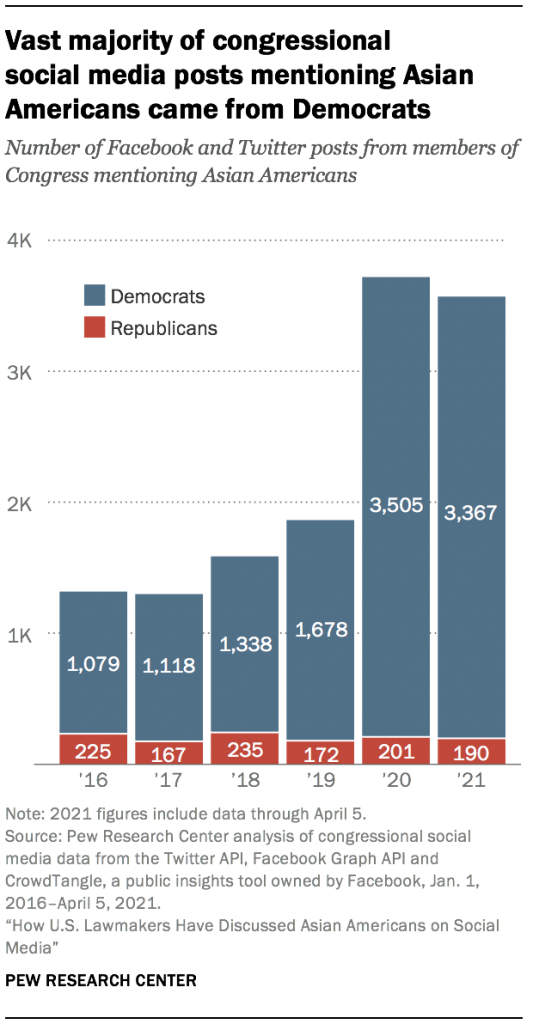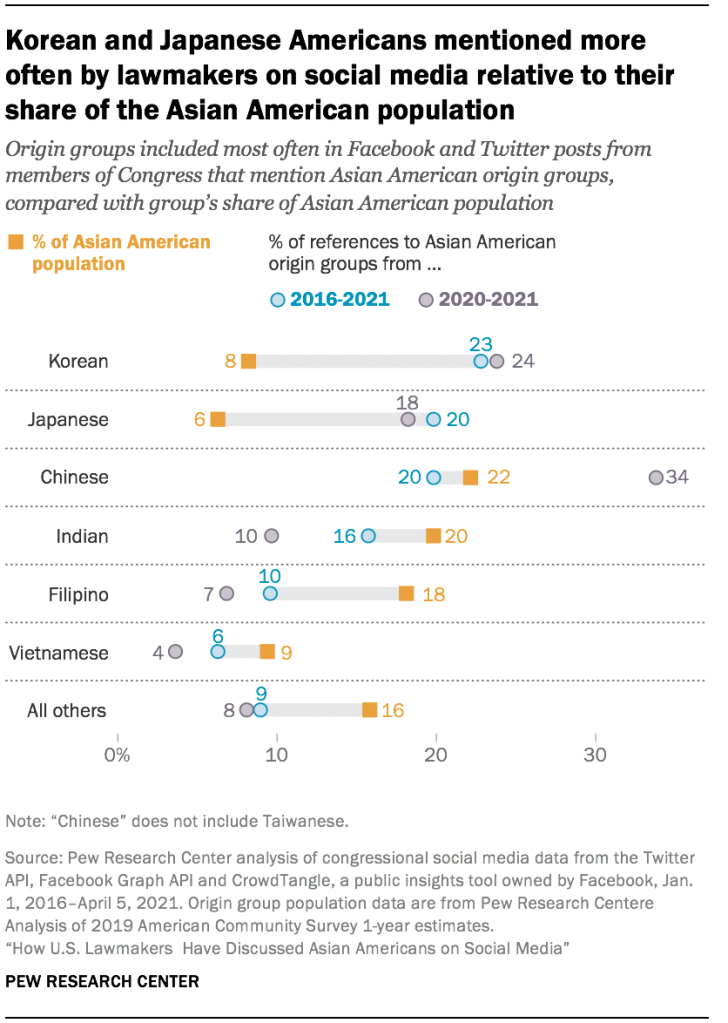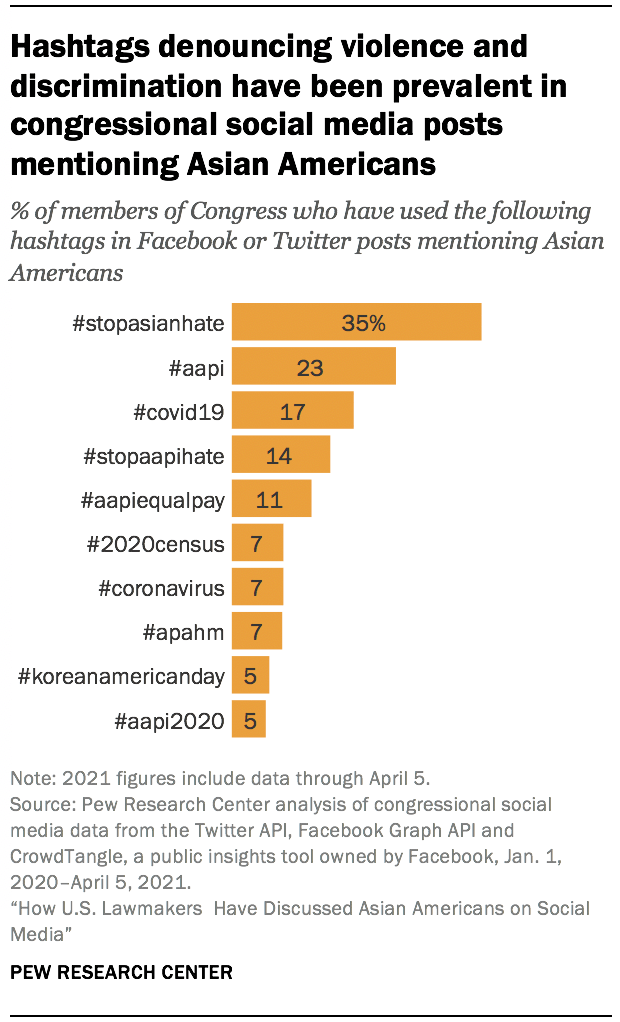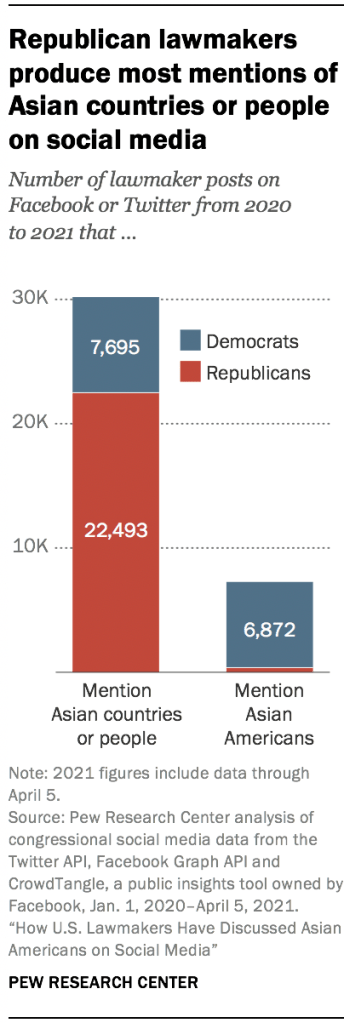Majority of posts about Asian Americans in 2020 and early 2021 mentioned concerns about violence, discrimination or racism
This report examines how often – and in what context – lawmakers mention Asian Americans in their public-facing communications on social media. To conduct this analysis, Pew Research Center collected every Facebook post and tweet created by every voting member of Congress between Jan. 1, 2016, and April 5, 2021. The analysis includes official, campaign and personal accounts.
Researchers from the Center identified all posts that directly mentioned Asian Americans, either collectively or in the context of smaller subgroups, using a list of keywords. These keywords include the term “Asian American”; acronyms like “AAPI” that are commonly used to describe Asian Americans; names of the most common Asian American origin groups as defined by the U.S. Census Bureau (such as “Chinese American” or “Pakistani American”); and common hashtags relevant to Asian Americans (such as #APAHM, used to refer to Asian Pacific American Heritage Month). Researchers did not search for mentions of Asian American individuals by name.
In addition to identifying all posts in this time period that referenced these terms, researchers from the Center also conducted an in-depth content analysis of posts from January 1, 2020, to April 5, 2021 to identify those expressing concern about racism, discrimination or xenophobia against the Asian American community.
See the Methodology for more on how this analysis was conducted.
Asian Americans, Native Hawaiians and Pacific Islanders are often referenced as a single entity, although each group has its own unique histories, cultures, languages and other characteristics. This report primarily focuses on lawmaker references to Asian Americans in social media posts, and identified these posts in part by looking for mentions of their detailed origin groups. But in order to capture as many relevant posts as possible, the search terms also included common acronyms or phrases that are relevant to Asian Americans, Native Hawaiians and Pacific Islanders alike (such as “AAPI”).
In addition, the Center’s historical database of congressional social media data includes only voting members of Congress. As such, it does not include delegates from Guam, American Samoa or the Northern Mariana Islands (or those from Puerto Rico, the Virgin Islands or District of Columbia).
Asian Americans are defined by their diversity. With roots in more than 20 different countries, the Asian American population as a group nearly doubled between 2000 and 2019. Demographic shifts have led to increased prominence for Asian Americans in the voting booth and the halls of Congress. At the same time, 32% of Asian adults say they have feared that someone might threaten or physically attack them due to their race in the wake of violent incidents against Asian Americans during the ongoing coronavirus outbreak.
In the midst of these political and cultural developments, a Pew Research Center analysis of more than five years of congressional social media activity finds that lawmakers are increasingly mentioning Asian Americans on Facebook and Twitter.
From 2016 through 2019, lawmaker mentions of Asian Americans on social media – either of the population at large or of smaller subgroups – followed a relatively predictable pattern. Members of Congress collectively mentioned this group fewer than 2,000 times in each of these years, with monthly mentions consistently reaching their peak as lawmakers commemorated Asian Pacific American Heritage Month in May.1
The volume and timing of these posts diverged from the 2016-2019 trend starting in early 2020, as members of Congress produced more than 1,400 posts mentioning Asian Americans in the first four months of that year. And in three first three months of 2021, lawmakers have greatly surpassed the total number of yearly mentions of Asian Americans in every year from 2016 through 2019 – and have nearly exceeded the total number of mentions from all of the previously record-setting year of 2020.2
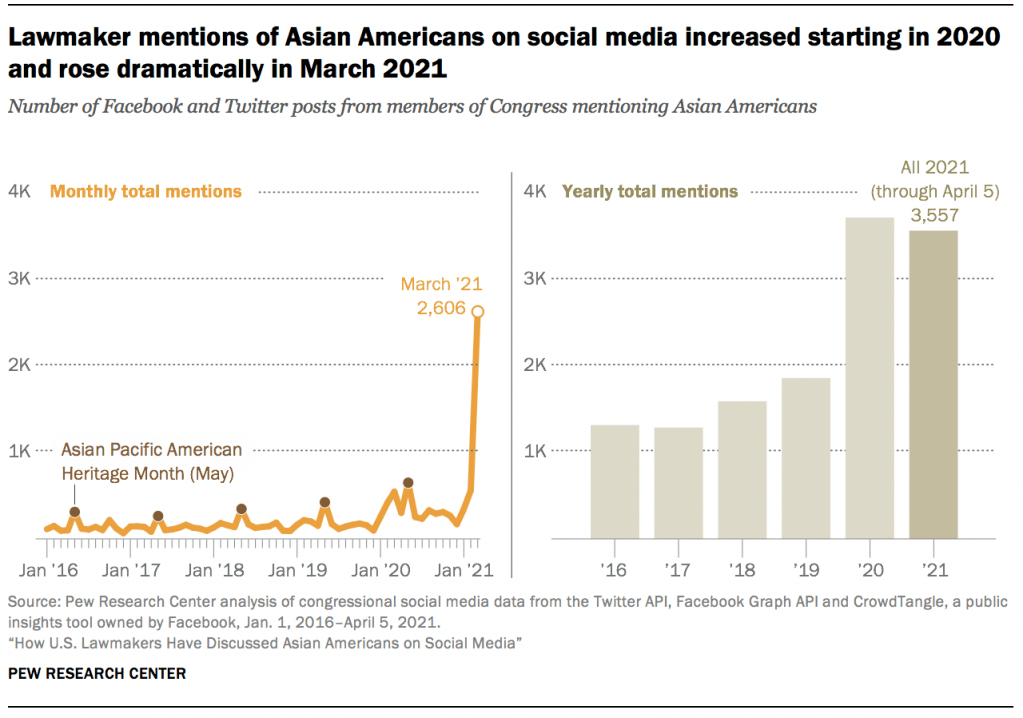
In the month of March 2021 alone – before the fatal shooting of six Asian women and two other people in the Atlanta area on March 16, as well as several other prominent incidents of anti-Asian violence – lawmakers posted over 2,500 references to Asian Americans, a figure that is larger than the yearly totals for any year prior to 2020.
In addition to producing a larger volume of posts that reference Asian Americans, a greater share of lawmakers are taking part in this conversation than was true in past years. In 2016, 167 members of Congress (representing 31% of active members during that time) posted on social media mentioning Asian Americans. In the first three months of 2021, 312 members – or 59% of all active lawmakers – have done so.
Democratic lawmakers have produced most Facebook and Twitter posts mentioning Asian Americans
Democratic lawmakers have produced the vast majority of congressional posts mentioning Asian Americans since the Center began systematically collecting these tweets and Facebook posts. In every year dating back to 2016, Democratic members of Congress have accounted for a minimum of 83% of posts mentioning Asian Americans.
More recently, Republican lawmakers have produced just 391 of the 7,263 such posts from members dating back to January 2020 (Democrats produced the remaining 6,872). During that same period, 93% of Democratic lawmakers – but just 32% of Republicans – have made at least one explicit reference to Asian Americans on social media.Members of Congress who are themselves Asian American or Pacific Islander American also produce an outsize share of these posts. This group has comprised just 4% of active lawmakers and have produced 6% of all congressional posts on Facebook and Twitter – on any topic – dating back to January 2020.3 But these members produced roughly one-third (36%) of all social media posts mentioning Asian Americans during that time period.
This prominent role that Asian or Pacific Islander American lawmakers play in this online discussion spans party affiliation. Some 6% of Democrats in the current (117th) Congress are of Asian or Pacific Islander origin, but these lawmakers have accounted for one-third (33%) of all posts from Democratic lawmakers mentioning Asian Americans in 2021. Similarly, the 1% of Republican lawmakers who are Asian or Pacific Islander American have produced 42% of all such posts from Republican members during that time period.
References to Korean, Japanese, Chinese and Indian Americans make up bulk of lawmaker mentions of Asian American origin groups since 2016
Six major origin groups – Chinese, Indian, Filipino, Vietnamese, Korean and Japanese Americans – comprise the vast majority of Asians in the United States. And these same six groups also account for the overwhelming majority of references to Asian American origin groups by lawmakers on social media.
But certain origin groups are mentioned disproportionately by lawmakers on social media relative to their share of the Asian American population. In particular, Japanese and Korean Americans have been overrepresented by this metric.
From Jan. 1. 2016, to April 5, 2021, Japanese Americans were mentioned in 20% of posts that referenced Asian American origin groups, more than three times their share of the Asian American population (6%). And references to Korean Americans accounted for 23% of lawmaker mentions of Asian American origin groups, despite this group making up just 8% of the Asian American population.
Notably, Korean and Japanese Americans are overrepresented in Congress itself in relation to their respective population sizes. Of the 24 Asian or Pacific Islander members who served over the entire time period, 10 of them are of either Korean or Japanese descent. And when Asian American lawmakers mention specific origin groups in their posts, they tend to reference their own more than any other.
Some origin groups have grown more or less prominent in lawmaker mentions over time. Dating back to 2016, mentions of Chinese Americans have accounted for 20% of lawmaker mentions of Asian origin groups – a figure that is roughly in line with their share of the population. But in 2020 and 2021, mentions of Chinese Americans have made up nearly one-third (34%) of lawmaker origin group references. Conversely, since 2020 mentions of Indian Americans have made up a smaller share of lawmaker references to Asian origin groups than in the four years prior.
Since early 2020, a majority of posts about Asian Americans have expressed concern about violence, racism, xenophobia, discrimination or lack of Asian representation
Examples of posts mentioning concern about violence or discrimination toward Asian Americans
“The attacks in Atlanta are horrifying & tragic. Six #AAPI women were killed. My thoughts & prayers are with the families that have lost loved ones during this unconscionable tragedy. While the investigation is ongoing, I join the AAPI community against the hate and attacks.” – Rep Young Kim, R-Calif., March 17, 2021
“Viruses don’t have an ethnicity. There’s no place for this kind of blatant, senseless racism anywhere, and particularly not in CA-17.” ‘Multiple Asian-owned businesses targets of vandalism in San Jose https://t.co/sKS0Q4D2Uq’ – Rep. Ro Khanna, D-Calif., April 23, 2020
“If you are poor, Black, Latinx, Asian American, Pacific Islander or Indigenous, you are at much greater risk during this pandemic. Democrats are committed to ensuring America’s response addresses that disparity – and it is time Republicans joined us in that fight. https://t.co/RydHB7FjBJ” – Rep. Barbara Lee, D-Calif., Oct. 17, 2020
“Asian American women earn as little as $.50 for every $1 a white man makes doing the same job. That pay gap means it’s harder to afford healthcare and groceries, hurting families & communities. The House already passed #PacycheckFairness. It’s time the Senate acts! #AAPIEqualPay” – Rep. Judy Chu, D-Calif., Feb. 11, 2020
Since early 2020, one area of topical focus has stood out over all others in lawmaker posts mentioning Asian Americans. Of the more than 7,000 posts that mentioned Asian Americans from Jan. 1, 2020, through April 5, 2021, 64% mentioned or expressed concern about racism, discrimination, xenophobia or violence toward Asian Americans. Cetain key topics and events stand out within these posts. Many posts were spurred by the Atlanta spa shootings and other acts of violence against Asian Americans in March 2021. As noted above, lawmakers produced a record number of posts mentioning Asian Americans during that month. And nearly all of these posts (91%) expressed concern about violence, racism or discrimination against Asian Americans.
Another set of posts mention violence, racism or discrimination toward Asian Americans during the COVID-19 pandemic. Some 33% of all posts mentioning concern about Asian Americans since the beginning of 2020 explicitly mentioned terms such as “COVID,” “pandemic” or “coronavirus.”
The remaining posts are a broad mix that make reference to prominent historical events or to general disparities and inequities in the Asian American community. These posts cover a wide range of events and topics, such as the importance of Asian American participation in the 2020 census; remembrances of the internment of Japanese Americans during World War II; disproportionate health outcomes among Asian Americans; and Asian representation in movies and popular culture.
As is true of posts that mention Asian Americans more broadly, Democratic lawmakers have produced the vast majority (97%) of these posts that express concern about the Asian American community. And nearly half (45%) of active Democratic lawmakers have produced at least one such post since January 2020, compared with just 6% of Republicans.
In many cases, these expressions of concern include Asian Americans as one group in a broader set of racial and ethnic groups who have experienced historic or ongoing discrimination. Some 11% of these posts also include mentions of groups such as Black, Hispanic or Native Americans along with Asian Americans.
Since the start of 2020, #StopAsianHate was most common hashtag used in lawmaker posts about Asian Americans
Since the beginning of 2020, #StopAsianHate has been the most common hashtag used in lawmaker posts mentioning the Asian American community. Some 35% of active lawmakers used this hashtag from Jan. 1, 2020, through April 5, 2021, while 14% used the similar #StopAAPIHate hashtag.
The use of each hashtag increased dramatically in the wake of the Atlanta spa shootings on March 16, 2021. From the beginning of 2020 through March 15, 2021, lawmakers used these hashtags just 93 times. But from March 16 through April 5, 2021, these two hashtags were used by lawmakers a total of 1,265 times. As is true of social media posts mentioning Asian Americans more broadly, the vast majority of posts mentioning these two hashtags (99%) were produced by Democratic lawmakers.
Other popular hashtags in posts mentioning Asian Americans touch on a variety of issues. They include those related to the COVID-19 pandemic (#covid19, #coronavirus), concerns about equal pay for Asian Americans (#aapiequalpay), the 2020 census (#2020census) and a variety of other hashtags related to the broader community.
Republican lawmakers are far more likely to mention Asian countries or people absent any references to Asian Americans
Beyond posts directly mentioning Asian Americans and their origin groups, there is a broader universe of lawmaker social media posts that mention Asian countries without any reference to Asian Americans specifically. For instance, this might include a post in which the writer refers to “China” or “Chinese people,” but does not mention “Chinese Americans.” All told, lawmakers produced more than 30,000 such posts mentioning Asian people or countries from the beginning of 2020 through April 5, 2021. That is more than four times as many as mentioned Asian Americans.
The vast majority of both Democratic (96%) and Republican (98%) lawmakers have posted at least once since early 2020 about Asian countries or their populations. But Republican members of Congress have produced a much greater share of the total number of congressional posts mentioning these terms. Of the just over 30,000 posts since the beginning of 2020 that met this criteria, more than 22,000 of them (75% of the total) were posted by congressional Republicans.
To put these figures in context, since January 2020 Democratic members of Congress have created a similar number of posts on Facebook and Twitter mentioning Asian Americans (6,874) and mentioning Asian countries or origin groups (7,695). But in the same time period, Republican lawmakers have shared 58 times as many posts mentioning Asian countries and people (22,493) as have mentioned Asian Americans (391).
Some 90% of posts by members of Congress in this category mentioned “China” and the “Chinese” origin group specifically. The next most prevalent countries and people mentioned are “Vietnam/Vietnamese” (8%) and “Korea/Korean” (6%).
